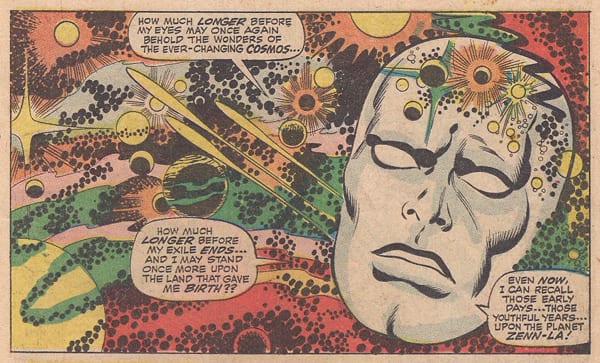First thing this morning, take an astral trip to tomorrow's comic shop new-releases shelf with Joe McCulloch, who will point out the most intriguing titles and tell you a little about them. Before that, he will try to buttonhole you with a mini-essay on webcomics. Your call on whether or not to listen (no one can see you through your computer -- or at least we can't), but I've found it's almost always a rewarding experience.
After that, you're going to want to get some place comfortable and block out some time to read, because Jeff Trexler is here with a massively informative article, "Taking Back the Kirby Case", which not only recaps the recent Marvel v. Kirby ruling, but takes you through the whole judicial history of work-for-hire and explores a long-shot legal strategy that might get the Kirbys their copyrights. This is highly recommended:
[As] I re-read last week's opinion affirming that Jack Kirby's Marvel material was work made for hire, I started noticing certain aspects of the three-judge panel's reasoning that made me wonder if there were more to this case than just another reason for creators to feel discouraged. For example, in her 2011 summary judgment opinion against the Kirbys, Judge Colleen McMahon began with a most unusual disclaimer, all but apologizing for the fact that her ruling was grounded in law, not fairness. The appellate court made no such distinction. Instead, its Marvel v. Kirby opinion sent the clear message that its ruling was fair and just.
This face-off over fairness was both a challenge and a clue. Could it be that the case has exposed fundamental problems not merely with how Marvel treated Kirby, but with the law itself?
The answer to this question could determine whether the Kirby family has any chance of having the appellate court ruling reversed. Unlike the U.S. Court of Appeals, the Supreme Court does not have to rule on every case submitted for review. Instead, it grants certiorari to — that is to say, it accepts — only a small percentage of the thousands of petitions it receives every year. Its basis for choosing a particular case typically goes beyond a factual dispute, such as whether Jack Kirby, Stan Lee, or Steve Ditko deserves the most credit for creating Spider-Man. Instead, the Court looks for a legal issue on which appellate courts disagree or that raises important constitutional concerns.
The following analysis is one possible approach.
Elsewhere:
—There are a of UK-based links right now, probably due to the Edinburgh International Book Festival. The Guardian has a profile of Anders Nilsen, and samples from the sketchbooks of Kate Beaton, Jeffrey Brown, Rutu Modan, and Chris Ware.
There are also videos from Ware and Joe Sacco's appearances at the festival, which I found via FP.
—Also from across the Atlantic, the Glasgow Herald-Scotland has a list of the "50 greatest graphic novels of all time". It's a weird but solid list, in that I don't think many would pick these fifty books in this particular order as their own top 50, but the books are worth reading, so it is more useful than a lot of these lists.
—Also in list news, Spin has declared that two of the worst cultural moments of the '90s were related to comics.
—The New Yorker blog has seven cartoons from Egypt.
—Graeme McMillan tells the readers of Time about Jack Kirby, and Douglas Wolk goes to Slate to tackle that old, old playground debate: who's better, Marvel or DC?
—The CBLDF has posted the speech Charles Brownstein gave on manga freedom in Tokyo.
—The L.A. Times reviewed the new Optic Nerve from Adrian Tomine.
—Joe McCulloch and Janean Patience have part three of their Marshal Law conversation.
—And finally, Chris Butcher talks a little bit more about DC's Villains Month cover promotion.






